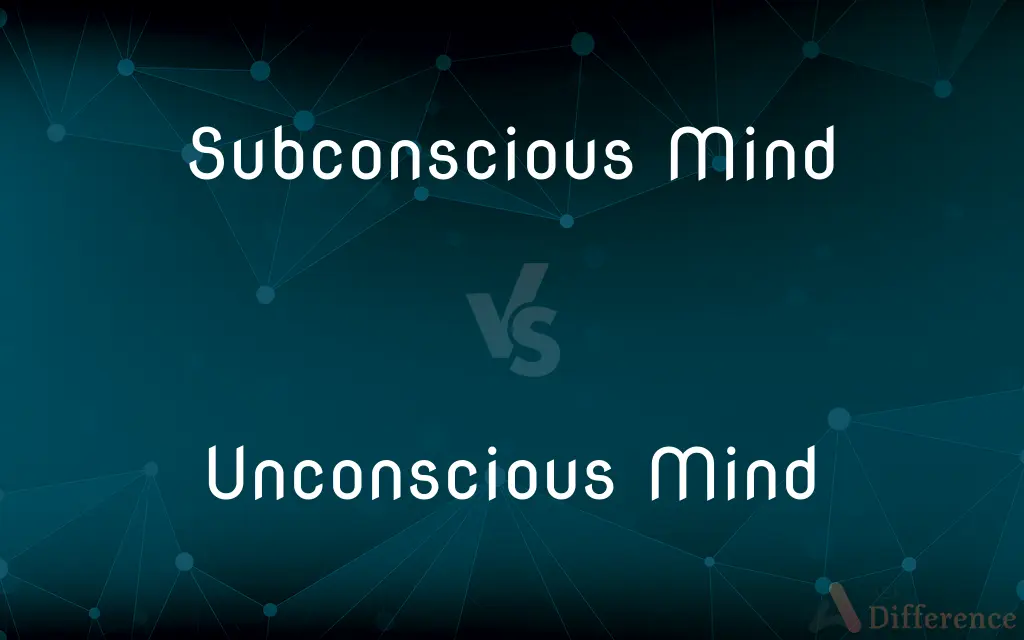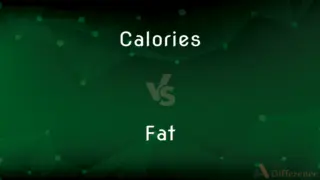Subconscious Mind vs. Unconscious Mind — What's the Difference?
By Tayyaba Rehman & Fiza Rafique — Published on February 6, 2024
The subconscious mind processes thoughts just below awareness, influencing habits and beliefs. The unconscious mind stores deep, often inaccessible mental processes, including instincts and repressed memories.

Difference Between Subconscious Mind and Unconscious Mind
Table of Contents
ADVERTISEMENT
Key Differences
The subconscious mind operates just below the level of conscious awareness, influencing our thoughts, feelings, and actions with the underlying patterns and beliefs we've developed over time. The unconscious mind, on the other hand, is a deeper realm where our most basic instincts, memories, and experiences are stored, often inaccessible to our conscious thought processes.
While the subconscious mind can influence our day-to-day decisions and behaviors through learned associations and repeated actions, the unconscious mind holds the more primal, often repressed aspects of our psyche. These include fundamental fears, desires, and the psychological constructs that shape our personality and behaviors in ways we may not be fully aware of.
The concept of the subconscious mind is often used to describe the mental layer where automatic skills and responses are stored, such as riding a bike or typing on a keyboard, which don't require our full attention. The unconscious mind, in contrast, is seen as a reservoir of feelings, thoughts, urges, and memories that are outside of our conscious awareness, influencing us in profound, sometimes inexplicable ways.
Understanding the dynamics between the subconscious and unconscious minds is crucial for psychological and therapeutic practices, as it helps in addressing deep-seated issues and patterns that affect mental health and wellbeing. By exploring the subconscious, we can uncover the influences on our conscious mind, while delving into the unconscious can reveal the foundational aspects of our character and emotional landscape.
In essence, the subconscious mind bridges the gap between the conscious and unconscious layers of our mind, playing a pivotal role in shaping our perceptions, reactions, and interactions with the world around us. The unconscious mind, however, remains a more mysterious and elusive domain, where the core elements of our psychological makeup reside, often dictating our responses in ways beyond our immediate understanding.
ADVERTISEMENT
Comparison Chart
Awareness Level
Below conscious awareness, but accessible
Deeply buried, often inaccessible
Influences
Habits, beliefs, automatic processes
Instincts, repressed memories, primal desires
Accessibility
Can be accessed through therapy, reflection
Harder to access, requires deeper work
Role in Daily Life
Influences everyday decisions and behaviors
Drives deeper, often unexplained reactions
Psychological Theories
Used in various therapeutic practices
Central to psychoanalytic theories
Compare with Definitions
Subconscious Mind
Influences preferences and dislikes subtly.
My sudden craving for ice cream was a whim from my subconscious mind.
Unconscious Mind
Central to psychoanalytic theories and therapy.
Therapy sessions often delve into the unconscious mind to heal past traumas.
Subconscious Mind
The layer of mind handling automatic tasks and influences.
My ability to type without looking at the keys is managed by my subconscious mind.
Unconscious Mind
Influences behavior in ways beyond our conscious awareness.
My avoidance of conflict is deeply rooted in my unconscious mind.
Subconscious Mind
Can be tapped into for creative problem-solving.
Solutions often come to me from my subconscious mind when I least expect them.
Unconscious Mind
Governs deep-seated emotional responses.
My intense reaction was a surge from my unconscious mind.
Subconscious Mind
Stores learned behaviors and repeated actions.
Driving home on autopilot is a task of the subconscious mind.
Unconscious Mind
Holds the keys to understanding our deepest desires.
Dreams often reveal the desires hidden in our unconscious mind.
Subconscious Mind
Acts as a mediator between conscious and unconscious minds.
My fear of spiders is less intense now, thanks to reprogramming my subconscious mind.
Unconscious Mind
Stores repressed memories and primal instincts.
My irrational fear of the dark stems from my unconscious mind.
Common Curiosities
What is the unconscious mind?
The unconscious mind stores deeper, often inaccessible mental processes and memories.
What is the subconscious mind?
The subconscious mind processes thoughts and actions just below conscious awareness.
What are some examples of subconscious processes?
Breathing, heartbeat, and automatic habits are examples of processes controlled by the subconscious mind.
How does the Subconscious Mind differ from the Conscious Mind?
The conscious mind is aware and rational, while the subconscious mind processes information without conscious control.
Can we control our subconscious mind?
To some extent, through practices like mindfulness and positive affirmations.
How do the subconscious and unconscious minds differ?
The subconscious is more accessible and influences daily habits, while the unconscious contains deeper, repressed aspects of the psyche.
Can the Subconscious Mind be accessed intentionally?
Yes, through techniques like meditation and hypnosis, people can access and influence their subconscious thoughts and beliefs.
Is the unconscious mind always inaccessible?
It's challenging to access, but not impossible, often requiring deep psychological work.
Does the Subconscious Mind play a role in memory?
Yes, the subconscious mind stores memories and can affect how memories are recalled and experienced.
Can the Unconscious Mind influence behavior without awareness?
Yes, the unconscious mind can influence behavior and emotions without the individual being consciously aware of it.
Are the terms "Subconscious" and "Unconscious" interchangeable?
No, they are not interchangeable. The subconscious mind is more accessible and contains processes just below conscious awareness, while the unconscious mind is deeper and often contains repressed material.
Are dreams related to the Unconscious Mind?
Yes, according to Freudian theory, dreams are a manifestation of the unconscious mind's desires and conflicts.
Can both the Subconscious and Unconscious Minds impact decision-making?
Yes, both can influence decision-making, with the subconscious being more accessible for conscious influence.
Do psychologists agree on the precise definitions of these terms?
There is ongoing debate and variation in how psychologists define and use these terms, but they generally refer to different levels of mental processes.
What is the significance of the Unconscious Mind in psychoanalysis?
Sigmund Freud's psychoanalytic theory emphasizes the role of the unconscious mind in shaping personality and behavior.
Share Your Discovery

Previous Comparison
Calories vs. Fat
Next Comparison
Peanut Butter vs. JellyAuthor Spotlight
Written by
Tayyaba RehmanTayyaba Rehman is a distinguished writer, currently serving as a primary contributor to askdifference.com. As a researcher in semantics and etymology, Tayyaba's passion for the complexity of languages and their distinctions has found a perfect home on the platform. Tayyaba delves into the intricacies of language, distinguishing between commonly confused words and phrases, thereby providing clarity for readers worldwide.
Co-written by
Fiza RafiqueFiza Rafique is a skilled content writer at AskDifference.com, where she meticulously refines and enhances written pieces. Drawing from her vast editorial expertise, Fiza ensures clarity, accuracy, and precision in every article. Passionate about language, she continually seeks to elevate the quality of content for readers worldwide.













































